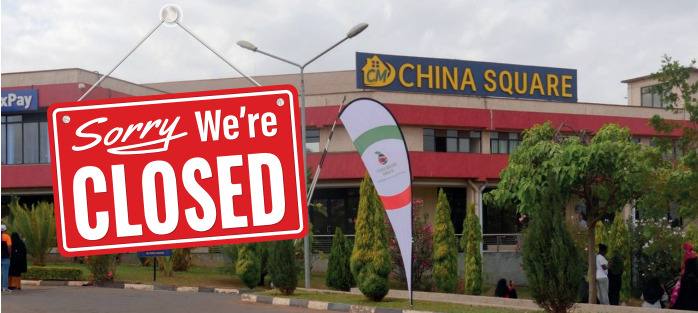Reading between the lines of the controversy, protests and closure of China Square

China Square is a retail supermarket at Unicity Mall off Thika Superhighway and is owned by Kenyatta University. The mall was conceived as a project to bring in funds to the university but since its opening in 2016 has not attracted a lot of footprint due to the lack of an anchor client. That was until China Square set up at the mall and attracted hordes of customers due to its affordable goods.
Queues are said to have been so long that customers waited for hours to pay at the cashiers. Most malls in Kenya attract a huge footprint when they have an anchor client, usually a supermarket chain, to draw in the hordes. Unicity lacked this client but China Square changed all that.
China Square set up shop last year but has since shut down after it found itself marred with controversy. Just two weeks after opening, the shop had made Kshs. 20 million according to its owner and the reason for the mad rush was the cost of goods. The owner said he decided to open the shop upon realisation that most goods from China are overpriced in Kenya. He therefore sought to bring in Chinese goods and sell them at affordable prices. This provoked the ire of Kenyan traders who make trips China to buy the goods and sell them locally.
The traders, under the umbrella body of Gikomba, Nyamakima, Muthurwa & Eastleigh Traders Association, have protested the establishment of China Square as they see this as a takeover of local business by foreigners. China Square sells their products at 45% less than what the local traders sell at. This has been the attraction point to the mall. Local traders on the other hand claim that the foreigners get huge rebates from their own country which they themselves are not privy to hence the discrepancy in price.
The association is considered politically powerful if one considers that its displeasure with how former President Uhuru Kenyatta handled the issue of imported goods from China resulted in the association garnering huge support for President Ruto and his deputy in the last General Election. A persistent crackdown on counterfeits during the last regime subjected local importers to arbitrary taxes and an unpredictable tax regime which destroyed many businesses.
The association is said to have had meetings with the Deputy President and even held demonstrations in protest over the shop calling for its closure. Even the Cabinet Secretary for Trade, Mr Moses Kuria, got embroiled in the affair and asked the shop owner to close his business before ordering the Vice Chancellor of Kenyatta University to buy out the lease from the China Square owner and offer it to the Gikomba, Nyamakima, Muthurwa & Eastleigh Traders Association. That is until the matter threatened to become a diplomatic row, with the Chinese government and Foreign Affairs principal secretary Korir Sing’oei weighing in on the matter. Finally, Mr Kuria asked the proprietor to turn his business venture into a local manufacturing plant and work with local traders.
The matter is yet to be settled. Mr Lei Cheng has in the meantime issued a statement over the closure of his shop saying that it has been temporarily closed over security concerns, limited tills and inflammatory social media statements.
The Anti-Counterfeit Authority (ACA) on the hand has issued a statement saying it will return goods impounded from Cheng’s shop after someone complained that they were counterfeit and investigations proved this to be a false claim.
But even as turf wars arise with regard to the sale of imported goods in Kenya, the Kenya Association of Manufacturers launched their annual Manufacturing Priority Agenda on Friday and called for manufacturing-centric counties. According to the quarter 3 Gross Domestic Product (GDP) report by Kenya National Bureau of Statistics for 2022, the retail sector grew the GDP by 9.1% while the manufacturing sector grew by 2.4%, an indication that Kenya needs to work on its manufacturing sector to achieve structural change.
Kenya’s February’s Purchasing Managers Index (PMI) was at 46.6 indicating a deterioration in the manufacturing environment. The local manufacturing sector is battling high electricity prices, higher costs of imports, a weak shilling and unpredictable tax environment and inflation.

